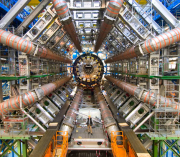God: Three Questions

When it comes to a spiritual position, there are at least three major positions you can take. There are three metaphysical questions you can ask yourself. Each question, if you answer "no," halts the process and defines your position.
The questioning continues so long as your answer is "yes." As the questioning continues, you approach a more and more specific concept of "God(s)."
Basically, it's a flow-chart that calculates your metaphysical point of view.
More importantly, it helps illustrate that spirituality is not limited to being strictly a theist or an atheist. It's bigger than that. There are levels. And levels within levels. I think it's interesting to compare and contrast those levels. Do they have things in common? If so, might they be equivalent in some ways?
Part of what concerns me is the idea that a given mode of spirituality is somehow the One True mode. I find that idea repellent. It seems illogical that the Operator(s) of the Universe would specify a single set of rules and deny spiritual success to all not following those rules. It seems much more sensible that the Operator(s) of such a vast and varied Creation would be just as vast and varied spiritually.

As Mohandas Gandhi said, "Religions are different roads converging to the same point. What does it matter that we take different road, so long as we reach the same goal. Wherein is the cause for quarreling?"
As I've mentioned before, all spiritual systems seem to have in common the idea that how you live life matters, that there is such a thing as good and evil. Given that common central core, perhaps those fundamental things might be worthy of our consideration if not our focus and energy.
In any event, there are three big questions we can ask. The answers to these questions are not currently provable by logic or science. I suspect that the existence (or not) of God(s) transcends physics and cannot be answered by logic or science. Proving a negative, the absence of God(s), is tricky. Proving a negative is always tricky. But we may someday prove conclusively that the human mind universally creates God(s), and that will be very close to negative proof. And, of course, if we ever actually see God(s), that'll be conclusive positive proof. You can prove a positive if what you seek is found!
But for now, the answers depend on how you believe reality works and are matters of faith.
Here are the questions:
- Is there a "metaphysical" reality at all (or is the physical all there is)?
- If there is a metaphysical reality, is it inhabited by a self-aware being or beings (or is it just a higher plane of reality or some sort of force)?
- If there are self-aware metaphysical inhabitants, do they interact with our physical reality and if so to what extent?
In other words:
- Is there anywhere for God to be?
- Is there anything that thinks, "I am God!"
- Is God (or are the Gods) concerned about us?
#1—Is there a metaphysical reality?

The world we know, all the matter and energy in the universe, is the physical reality. A metaphysical reality is somehow 'beyond' or 'above' that physical reality. It won't be something we perceive under normal circumstances; it won't follow the laws of physics. But to make it worth considering it must be accessible in some fashion that transcends our normal perceptions and physics.
It seems logical to assume that either it exists or it doesn't. There seems to be no middle ground. The question divides viewpoints into two distinct camps: those who believe in a transcendent reality and those who believe in an existential reality. This is a crucial fork in the road; it's where the believers and non-believers part ways.
If you decide there is no metaphysical reality, that's it, no more metaphysical questions. The physical world is all there is. Humans—all life forms—are just machines that carry out the driving imperative of all life machines: perpetuate the DNA. We are nothing more than a very successful survival mechanism designed by a complex molecule. Life is nothing more than interesting chemistry.

Which is not to say there's no majesty or mystery. That chemistry is extremely interesting, and there's plenty of mystery! And one thing science teaches us is that some questions don't have answers, no matter what. For example, the Heisenberg Uncertainty Principle puts a limit on how sharply defined the universe is. The Turing Halting Problem shows that computer algorithms cannot answer all questions. Reality is not algorithmic or specific; it's chaotic and fuzzy.
If you doubt this, try to answer this simple question: what is the first real number after zero? The question has no answer (like the one about the sound of one hand clapping). No matter how many zeros you put in after the decimal point, there's always room for one more.
So answering "no" to the first question still leaves lots of room for fun and thought. But a physical universe has no intrinsic meaning, which means life has no intrinsic meaning, which make it much harder to define a moral platform. Physics (and certainly chemistry) is interesting enough to get you out of bed each morning, but you have to try to forget that actually nothing you ever do will ever have any real meaning in the fullness of the universe.
On the other hand, if you believe there's more to reality than physics, you can then ask yourself questions about what that meta-reality might be. Which brings us to the next question.
#2—Is there a God?

If there is a metaphysical reality of some sort, a natural next question might be whether there are metaphysical beings (or even just one). While it might be possible to accept the idea of a metaphysical reality of some sort, this question represents a jumping-off point for many. If the idea of a metaphysics is one giant leap, the idea of metaphysical entities is another.
According to most Christian religions, the metaphysical reality consists of a Heaven and a Hell (and for some a Limbo). Those places are inhabited by native beings (such as Angels or Demons) as well as the souls of former inhabitants of the physical reality. They are also inhabited by Über-beings (God and Satan) who reign over their respective domains. And of course God is the Creator behind the whole thing; Satan is more of an acting CEO of his domain.
Other religions have different metaphysical realities and different beings, but most bear in common the formal idea of God(s) and of good versus evil. The details, customs and practices vary considerably, but all these have answered the first two questions with a "yes!"

But it is possible to believe in a spiritual metaphysics without believing in God(s). Buddhism, for example, is a metaphysical belief system that lacks a God (although it does have Devas and other metaphysical beings). And as with most successful religions, Buddhism has its variants. Some versions of it approach the idea of a metaphysical universe that just runs like a giant machine. (And, in fact, Buddhism does contain a giant wheel!)
Another example of a metaphysics without a Deity is "the Force" from the Star Wars movies. And even the Force, with its Good Side and Dark Side, embodies the idea of Good and Evil—that one characteristic so common in spiritual metaphysics. Many people who have a basically unstructured view of spirituality believe in something along the lines of the Force (or in some very stripped down version of Buddhism). The central view here is that we are all connected, are all morally equal, and that life matters for reasons beyond the physics.
There are other view that see a metaphysical reality, but see little or no spiritual element. There is the Platonic idea that reality is the imperfect expression of an underlying perfect mathematics. Math seems to describe reality in such eerily accurate ways that it begs the question of which is more real: the math or the reality. There is no such thing in real life as a perfect circle, but they are trivial in math. That physical reality lacks infinity and infinite points suggests a transcendence in math.

Or, perhaps, as in The Matrix, we're all part of some sophisticated computer simulation. When we die we just wake up in the real reality (where once again we can ask the same three questions!). To make the simulation work, of course we are not allowed to know we're part of a simulation. A more cruel version of this, like the Platonic idea, suggests we're nothing more than algorithms running in a vast program, and we are no more real than is the answer to 2 + 2.
The point is not to assume that a metaphysical reality necessarily involves the God(s) of any religion or any God at all. This second question draws the distinction between the idea of a metaphysics and the idea of God(s). Those who believe in a purely physical universe got off at level one. Those who believe in a Deity-free metaphysical universe get off here at level two.
Which brings us to the third, most fantastic, question.
#3—Does God care about us?

For many, this may be the hardest question to answer with a "Yes." It seems pretty easy (at least to me) to believe a metaphysics is possible (even likely). And it seems fantastic, but at least possible, that there could be a supernatural will behind existence. At the same time, I do understand the strong psychological reasons to assign that to wishful thinking. I will say that, for me, the probability seems vanishingly small, but is still non-zero, so I try to keep an open mind.
There is a sub-distinction we can make. Deists believe the universe was created with purpose and meaning by God(s). Theists go a step further in the belief that our daily lives are of interest to God(s). Theists believe that prayers are heard and acted upon, whereas deists believe prayer is only an exercise in meditation (which can certainly be of value to the one who prays, if not to anyone else).
I, for the most part, am a deist with strong agnostic leanings and the occasional dash of theist (which may well have more to do with my upbringing than reality).

The idea of a God that is concerned with our day-to-day lives seems beyond the fantastic. Yet this is exactly what many big religions say. That God is so powerful and omniscient as to be involved directly with our daily lives. Such a God hears prayer (and apparently frequently says "no"). Such a God seems to have such a vast and sweeping plan that considerable pain and misery is necessary to achieve the plan. Apparently, as in many movies, it all turns out all for the good in the end (at least for some).
The psychological reasons to consign God(s) to wishful thinking really kick in here. To the extent the universe is, or seems to be, blind and uncaring, even cruel, it is easy to see why the human mind would want to believe in a supernatural being with a master plan. It is easy to see why we so desperately want and need to be connected to something that is concerned about us.
The thing is there have been many times in my life when one explanation of events is that "God took care of me." On the other hand, "coincidence" and "luck" are also possible explanations. So is the idea that life isn't as bad for most people as the news and horror stories make it seem, and we all muddle through somehow. The thing that has intrigued me in my life is the nature and frequency of these “coincidences.” It seems almost preposterous that it could be so, but until I see some proof one way or the other, I'm willing to leave it as an open question. It would be illogical and unscientific to consider the matter settled.

In any event, as with all these questions, the answer is up to you to decide! Does God watch you, listen to you, adjust life for you in any way? If you say definitely not, then you get off here on the third level. You've climbed to the metaphysical level and further to a deist level, but this is your stopping point.
Which leaves the top level for Theists who've piled belief upon belief upon belief. And while it's not an impossible proposition, it does require great faith. And if nothing else, perhaps that faith turns out to be important in the greater scheme of things.
I leave you with a final, question that applies to all levels:
#0—Is Your Faith Exclusive?

Given that any position you take and hold as true involves an element of faith, a reasonable question is whether your faith is the only correct view.
If you are hard-core atheist, are you absolutely convinced you are correct, or do you understand your view to be a matter of faith. Granted, science is consistent across time and space, but much is unexplained (and unexplainable). Do you leave room to doubt?
Likewise, if you believe in a spiritual path, do you see it as but one path up the mountain, or do you see it as the one true path. Are those on a similar journey up the same mountain, but who take a different path your kin or your enemies?
- WordPress Post (published August 14, 2011)